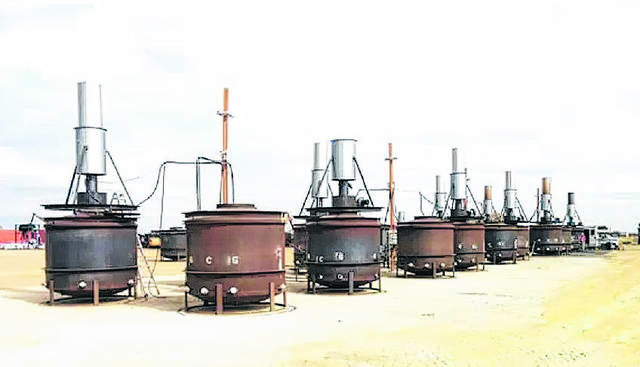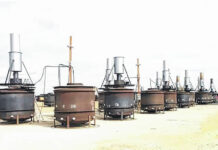
Photo courtesy of NCDEQ
This picture shows an example of a row of pyrolysis kilns that will be used to produce biochar in a similar setup to what will be used by ITD.
Construction of controversial industrial site to continue
HAMLET — The North Carolina Department of Environmental Quality’s Division of Air Quality on Tuesday approved International Tie Disposal’s application for a synthetic minor permit, which will allow the company to move forward with construction of a facility that will bring an estimated 55 jobs and $12 million in investment to the county but which caused nearby residents to fear damage to their health, quality of life, and a decrease in property values.
The permit’s approval comes along with additional conditions the company must adhere to to address issues that were raised by the public during the review process, outlined by the Department of Air Quality (DAQ) in a press release. Those include restrictions of operations to no more than 62 kilns conducting pyrolysis at one time, required documentation of each batch start and end time, verification of emissions during initial testing with side-by-side comparison to permit application emission factors, and the facility must request and gain approval from DAQ prior to reducing the testing frequency to every three years.
“As part of the compliance process, visible emissions are monitored to ensure equipment is operating correctly,” said Zaynab Nasif, public information officer for DAQ. “Recordkeeping and reporting is also required, and DAQ staff perform unannounced compliance inspections.”
While International Tie Disposal (ITD) can proceed with construction effective Tuesday, they will still need to satisfy requirements of local government for construction permitting, zoning compliance, and other regulations. Board of Commissioners Chair Jeff Smart declined to comment directly on the approval of the permit application, saying only that the commissioners will continue to monitor ITD’s progress towards construction.
DAQ held a public meeting on the company’s permit on Feb. 22 during which participants could ask questions of state officials and a public hearing on March 1 which only allowed comments to be submitted. The announcement comes nearly two weeks after the end of the 30-day review period following the hearing. During this extended period, the state requested additional information from the company and reviewed air quality modeling submitted by the facility, following multiple comments from concerned residents and Hamlet City Manager Matthew Christian to do so.
The modeling analysis focused on the facility’s emissions and compared it to nitrogen oxide (NOx) emissions from a nearby facility, according to DAQ.
“The analysis showed the facility could operate in compliance with the National Ambient Air Quality Standards,” DAQ said in a press release. “The testing and documentation conditions will be used to confirm the facility is operating as represented in the permit application, meeting the thresholds of the synthetic minor permit category and in compliance with the terms of the permit.”
The permit will expire on March 31, 2029.
International Tie Disposal, based in Weddington, submitted an application for a synthetic minor construction permit on Sept. 15, 2020 that would authorize the development of a biochar production site at 174 Marks Creek Church Rd., just outside of Hamlet’s city limits and extraterritorial jurisdiction. This site is within 2,500 feet of Hamlet’s water source which serves more than 10,000 residents.
The company’s business model is one of taking in large quantities of creosote-treated railroad ties and converting them into biochar through a process known as pyrolysis. The USDA defines pyrolysis as “the heating of an organic material, such as biomass, in the absence of oxygen” and explains further that, “(b)ecause no oxygen is present the material does not combust but the chemical compounds (i.e. cellulose, hemicellulose and lignin) that make up that material thermally decompose into combustible gases and charcoal.”
The prospect of this plant coming to the area was met with deep concern by nearby residents and local leadership. The residents feared for their health, and foresaw their property values and their quality of life taking a major hit due to the presence of an industrial site that would be potentially adding harmful particles to the air and water, creating more noise, and increasing industrial traffic.
In response, they formed the Richmond Clean Air/Water Coalition, and the public Facebook group under the same name has 565 members at time of writing. The members have been actively sharing information about the plant from their own research and updating others about the permitting process.
On March 1, the Coalition delivered 334 signatures to the Richmond County Board of Commissioners asking them to request that the state require ITD complete more thorough air modeling of their emissions as part of their permitting process. Board of Commissioner Chairman Jeff Smart received the signatures on March 2 and said in a March 26 text message that “nothing else has been done” by county leadership with regard to the request by the petitioners.
DAQ’s announcement Tuesday confirmed that the state did act on these requests for more air modelling.
Christian expressed gratitude that state environmental officials took the concerns of the citizens of Hamlet and Richmond County into account, which influenced the terms of the permit. The final hearing report commended the residents’ extensive research regarding the plant.
“In addition to the state-level permitting, the Richmond County Board of Commissioners are responsible for determining what types of land uses are appropriate in our community,” Christian said in a text following the announcement. “We remain concerned about the impact this industry will have on the City of Hamlet, our water customers, and our neighbors nearby. We remain committed to working with the entire community.
“We hope that Richmond County will facilitate more meaningful public engagement on these critical issues moving forward,” he continued.
Richmond County Economic Developer Martie Butler said she wasn’t surprised by the approval of the permit, adding that the county has “full confidence” in the state’s findings.
“ITD is a recycling company — taking negative products out of our waste stream, rail ties which litter our railroads and turning them into something positive, biochar,” Butler said in an email. “We in Richmond County look forward to working with DEQ and all regulatory agencies to ensure the safety and welfare of our citizens.”
One of the more outspoken residents against the construction of ITD’s facility was Chad Gardner, who operates chicken houses on an adjacent property to ITD’s plot along Marks Creek Church Road. Following the announcement, Gardner said that forcing ITD to stick to only 62 kilns operating per hour “lets me know that there was a reason to be concerned about this facility.”
He expressed gratitude to the other residents who spoke up about the plant, to the state for their work throughout the process, and to the Polivka family who owns ITD “for the changes they have agreed to make to the facility to make it safer.”
Gardner, along with his wife, Lisa, and Hope and Lonnie Norton, Hamlet and Dobbins Heights, is currently engaged in a lawsuit against Richmond County regarding the rezoning of the property ITD is operating on itself.
“I’m opposed to the facility being built but I think the root of the problem is the rezoning of the property and how it will negatively effect the community of Mark’s creek the city of hamlet and the township of dobbins heights,” Gardner said.
To support the Richmond County Daily Journal, subscribe at https://www.yourdailyjournal.com/subscribe.
Reach Gavin Stone at 910-817-2673 or [email protected].



